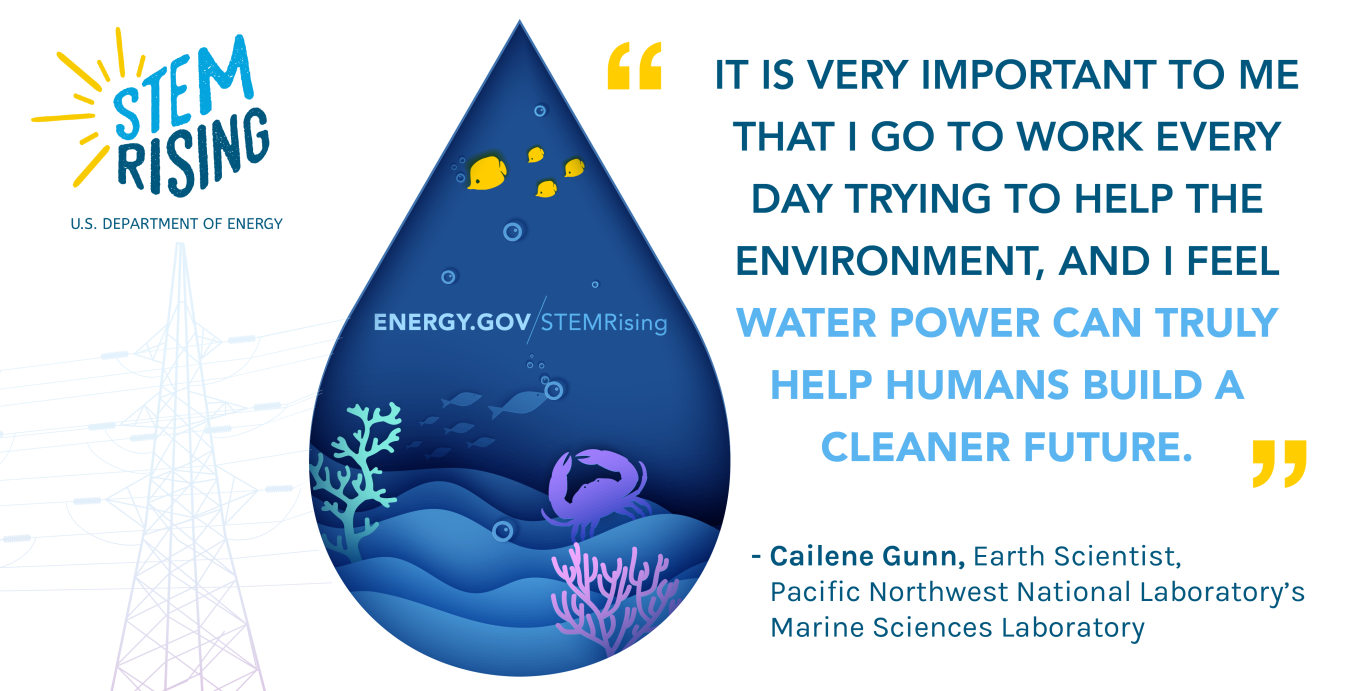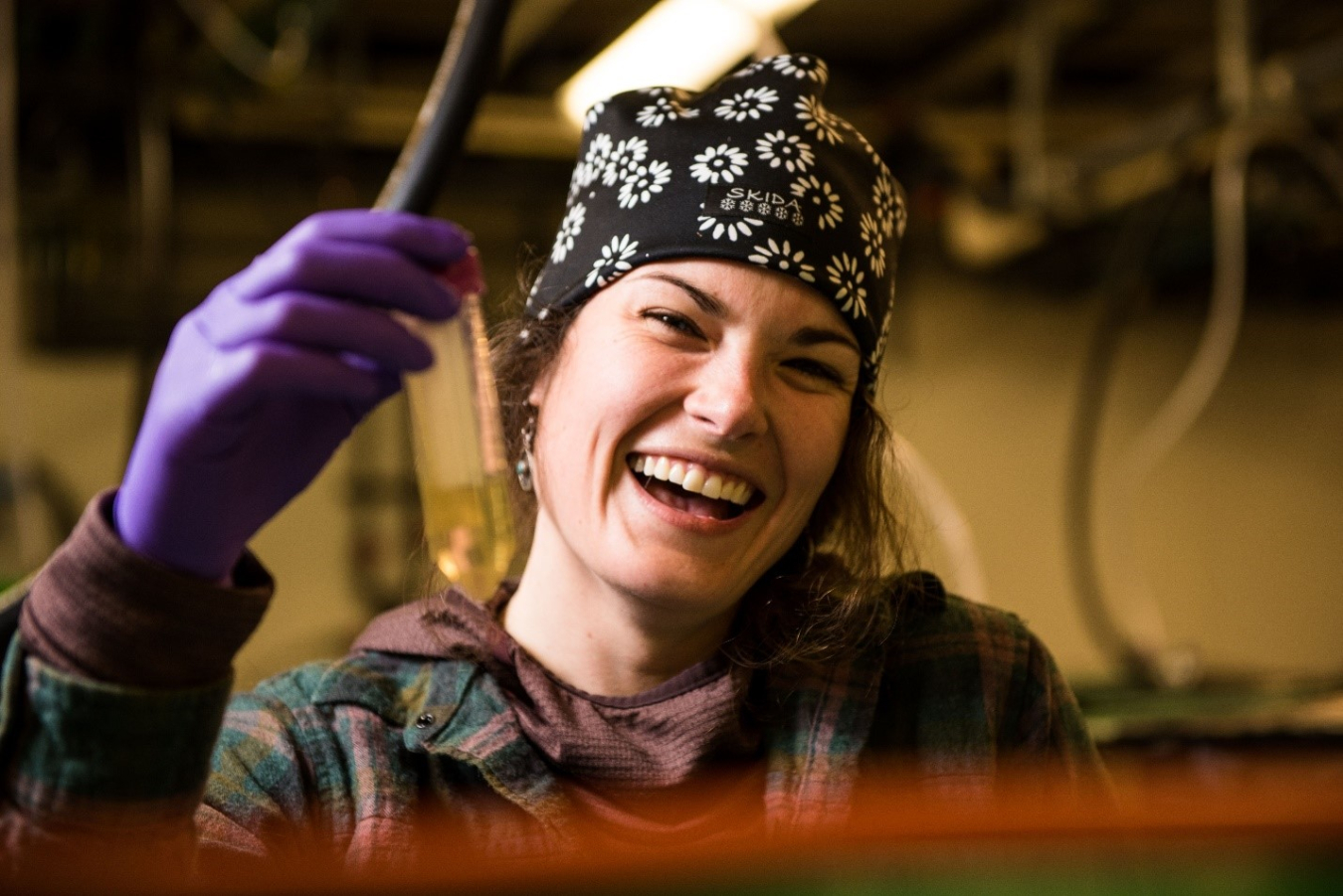Learn why Cailene Gunn loves her job as a Earth scientist at the Pacific Northwest National Laboratory’s Marine Sciences Laboratory (MSL).
June 22, 2020
June is Ocean Month, and to celebrate STEM Rising is sharing profiles of Energy Department staff in ocean-related careers. Meet Cailene Gunn.
My name is Cailene Gunn, and I am an Earth scientist at the Pacific Northwest National Laboratory’s Marine Sciences Laboratory (MSL). I received my bachelor’s degree in geology at Bates College in Maine and started as a post-bachelor’s research associate at MSL in 2016. I now work as a researcher studying many aspects of the coastal environment, including environmental impacts of marine renewable energy and biogeochemistry in wetland ecosystems. I am a STEM ambassador and dedicated to STEM outreach, education, and science communication.

What’s your favorite fact about the ocean?
The ocean is a kaleidoscope of life, so much of which we don’t see or know about. I think my favorite fact about the ocean is that about 95 percent of it is still unseen by human eyes. To look out over the ocean and know how vast, diverse, and undiscovered it is will never cease to amaze me. As scientists, we constantly seek to learn and discover more and more, but there is something incredible about knowing that the ocean will always hold secrets we may never understand.
What do you do to celebrate Ocean Month?
In my work, I celebrate Ocean Month by helping get the marine science work we do out into the world by writing stories about our team and sharing our research with the community through STEM outreach. In my personal life, I celebrate by walking down to the beach in Sequim, breathing in the salty air, and picking up any trash I see. The smallest efforts to clean up our oceans and beaches can add up to make a big difference.
What inspired you to work in water power?
To me, success in my career means making a positive difference in the world. It is very important to me that I go to work every day trying to help the environment, and I feel water power can truly help humans build a cleaner future. My work helps make it easier to harness the energy of the ocean so we can sustainably power our own human lives, but without harm to the ocean’s diverse and beautiful residents. I believe in marine renewable energy as a way to power our futures, and I’m inspired by my colleagues who have dedicated their careers to making this renewable resource more possible.
What do you do in your job?
My job looks different every single day. I support a variety of different research projects. A large part of my job involves collaborating with researchers and developers in the marine energy community to gather data about environmental impacts and share it with the industry. I also spend quite a bit of time in the field studying vegetation in wetlands, measuring carbon stocks of soils, restoring eelgrass populations, and helping divers on the boat. As a STEM ambassador, I participate in outreach in communities on the Olympic Peninsula, and I help other staff at PNNL develop science communication materials for their own outreach efforts. I love that my job is always changing and allows me to constantly learn and grow in new ways.
What books or movies about the ocean do you recommend?
Finding Nemo will forever be one of my favorite movies because it transports you into an underwater world—many of the portrayals of marine life are scientifically accurate, too! I also love BBC’s The Blue Planet documentary series. Each episode features the incredible life that dwells beneath the ocean’s surface, discusses the challenges oceans face with climate change, and calls on humans to help.
Always follow your passions! Get involved with communities of people who love the ocean as much as you do. Talk to people in the field, volunteer with organizations, and stay passionate. Learn as much as you can about the ocean and the challenges it faces and see if there is a career you are interested in that aligns with finding solutions to those challenges. Marine and coastal research requires so many people, including engineers, ecologists, biologists, divers, modelers, electricians, and a number of other roles. Many paths can lead you to a career studying the ocean.
Read more Ocean Month profiles and get information about STEM Rising at www.energy.gov/STEM

